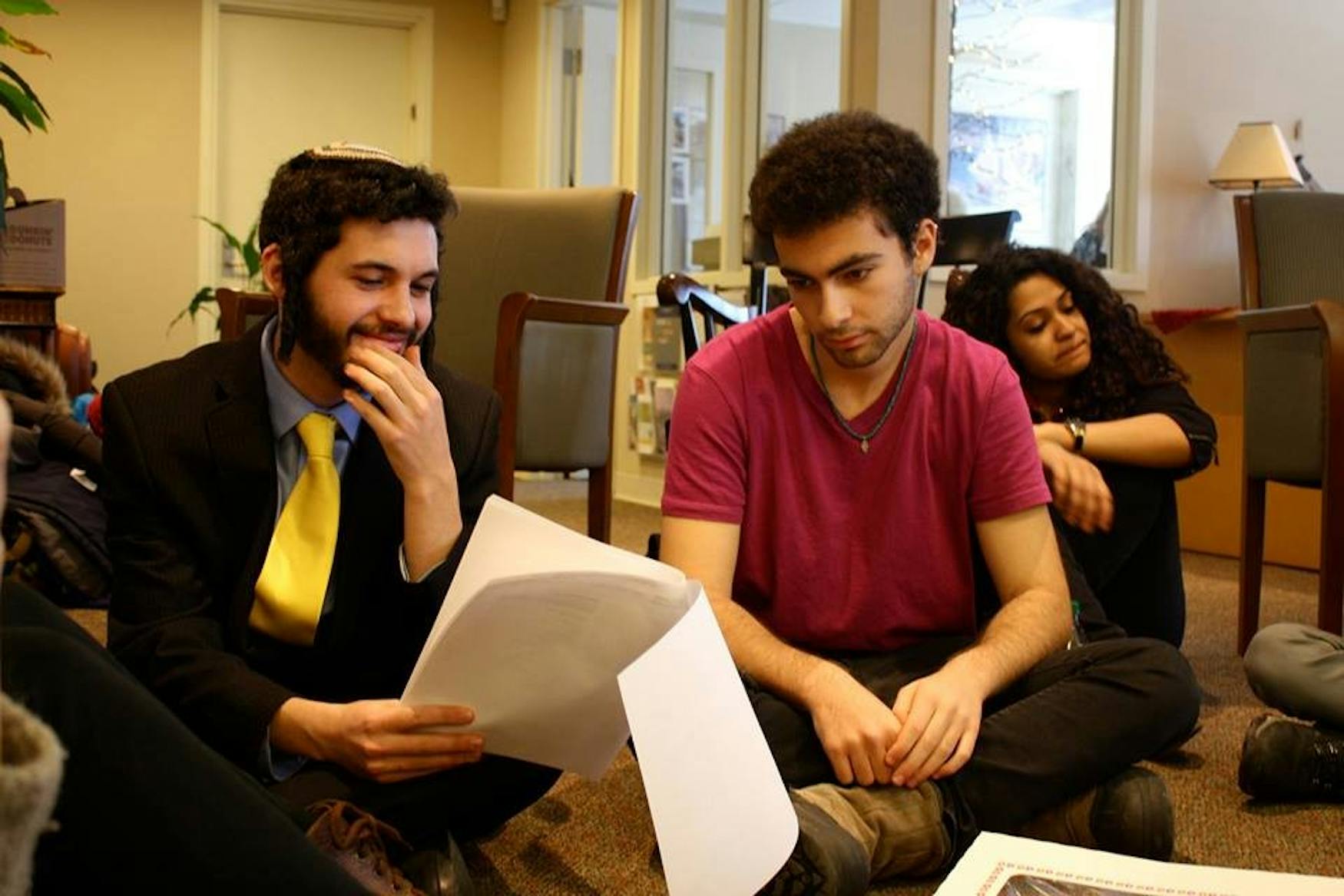Students push for dialogue
Last Friday, 15 students and alumni gathered outside University President Frederick Lawrence’s office to demand a meeting to discuss the renewal of the Brandeis University - Al-Quds University partnership.
The event was organized by Eli Philip ’15 and Catie Stewart ’16, who co-founded the Al-Quds University Student Dialogue Initiative in November 2013, shortly after the suspension was announced. According to Stewart, she, Philip and several other students had been requesting to meet with Lawrence for several months to discuss their initiative and the renewal of the formal partnership, but their emails were ignored.
According to Stewart, after over 200 students sent emails to the President urging him to renew the partnership, they were granted a response in November. However, Stewart said that they went through months of meeting cancellations and rescheduling before finally deciding to sit outside the President’s office until they were granted an audience. “Going to [President Lawrence’s] office was a last resort,” Stewart said in an interview with the Justice.
“It was pretty clear to us that we were not being heard and that our administration was not trying to have a conversation with us,” Stewart said. “As a last resort, we decided to go to his student office hours and bring a group of people who cared about this and who represented the 200 other students who cared about this.”
Stewart, Philip and active member of the Student Dialogue Initiative Naomi Hornstein ’15 told the Justice that the group of 15 students and alumni entered the office and were greeted by Lawrence’s secretary and chief of staff, who told them that Lawrence would not have the time to meet with them. Hornstein said that the group did not want to be denied a meeting yet again, so she “decided to have a community meeting in his office to show how much we care.” According to Hornstein, the group sat in a circle, read Israeli-Palestinian poetry and discussed with each other why the renewal of the partnership was so important. Eventually, she said, Lawrence came out and agreed to schedule a meeting with them within the week.
“We were really happy he agreed [to a meeting],” Stewart said, “but it was pretty shocking to us that it took us five months to get it … and that it took us sitting in his office for an hour for him to finally acknowledge that we mattered.”
The formal academic partnership between Brandeis and Al-Quds University in East Jerusalem began in 1997 after Al-Quds University President Sari Nusseibeh visited Brandeis. It was funded by a nearly one million-dollar grant from the Ford Foundation, according to a Nov. 19, 2013 Justice article. The University suspended the partnership in Nov. 2013 after a demonstration at Al-Quds during which students carried fake automatic weapons and “marched while waving flags and raising the traditional Nazi salute,” according to the article. Since the suspension, Lawrence has faced criticism for the decision from many members of the community, including students, alumni and faculty.
Philip, Stewart and Hornstein, along with several other students, went to Al-Quds University last summer through the Davis Projects for Peace Grant to renew student dialogue, despite the suspension. According to an April 2014 Justice article, the Projects for Peace program, now in its eighth year, gives an opportunity to undergraduate students from any members school to design a peace-building project through a $10,000 grant.
According to the article, Philip and Stewart received the grant last spring for their Al-Quds University Student Dialogue Initiative. Philip added that another small group of students also went to Al-Quds over winter break.
“Something I didn’t understand until I went to Al-Quds University [last summer] is how impactful the partnership was for them,” Philip said in an interview with the Justice. “It really helped them grow. Open dialogue and communication between different types of people … is enriching for both institutions.”
Hornstein mentioned that they notified their friends at Al-Quds University when President Lawrence agreed to schedule a meeting with them, and many of them “were very proud and excited that this is hopefully moving forward.”
“The [partnership] is something that really does represent the values of the University,” Stewart told the Justice. “It was not just symbolic … [the suspension] actually had a lot of negative ramifications for both universities,” she said.
Philip said that while they are thankful to have finally scheduled a meeting with President Lawrence, they want more from the administration. “We don’t want only meetings,” Philip said, “we want the meetings to lead to the restoration of the partnership.”
A statement provided to the Justice from Bill Schaller stated that the administration “appreciates the students’ interest in resuming the partnership with Al-Quds University” and that “a meeting is being scheduled with students to hear their views and recommendations.”




Please note All comments are eligible for publication in The Justice.